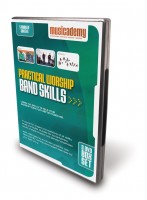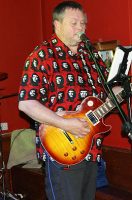- Home
- Products
- Sound Tech and PA
- Sound Tech DVDs & Downloads
- Free Tech Resources
- Free Sound Tech Lessons
- Playing By Ear
- Play By Ear DVDs & Downloads
- Ear Training & Music Theory Resources
- Worship Leading
- Worship Leading Course Downloads
- Free Worship Leader Training
- Free Worship Leader Resources
- Worship Band Skills
- Band Skills DVDs & Downloads
- DIY Worship Team Workshops
- Free Worship Team Training
- Free Worship Team Resources
- Christmas carol service, doing “Silent Night”. I had set it on mandolin with a very simple strummed guitar background, very few chords, very gentle and folksy. The keyboard player kept twitching and saying it wasn’t “Christmassy enough” so we had a chat, and he set up a nice big church organ sound, and played it: “See, Christmassy..!”
I then said: “No, that’s just a big church, for Christmassy it needs a Salvation Army brass band.”
Long pause, followed by: “Let’s hear your mandolin again” and then: “Sorry, but that’s really nice, let’s do it that way.” It’s a really good song. - Pentecost service, in the local park, all the churches represented, 2000 of us together, music led by Salvation Army brass band. In uniform. All good and fine, the hymns were nice, then I check the set list (I was on sound) and see:
“Blessed Be Your Name” (Redman / Redman)
My heart sinks. “What fresh *insert strong word* is this?” I wonder…
But it was absolutely fantastic! They’d got a really good arrangement and it sounded superb and we sung it really well. It’s a really good song. - You have ‘cello and harpsichord – do it *well* on that. (NOTE to reading instruments: don’t play the tune if people are singing. Musicademy’s Orchestral Instruments course will help them with what they should do).
- You have electric guitars but no drums – do it *well* with that, listen to old blues records, there are plenty of examples of how electric guitars can sound great with no rhythm section. (NOTE: Don’t let people play who can’t keep basic time or insist on clapping on 1 & 3).
- You have drums and percussion but no keys or bass – go “tribal” on it. (NOTE: Without cultural misappropriation, so no fancy shirts and hats please).
Separating song from genre
Two stories:
So, “Separating song from genre”: what exactly does that mean?
Most of the time we encounter new CCM (Christian Contemporary Music) songs as part of a recording or video or big church conference, and there’s a certain “sound” to it all, like U2 meet Coldplay in an elevator and they decide to share their music with a shopping mall.
Most of the time we encounter old “Traditional” songs in a small church with a few elderly people and played a bit lumpy on an out-of-tune piano or old organ, and there’s a certain “sound” to that too.
To bring traditional into a modern setting we’d hire a top line organist or keys player, maybe a choir and brass section, do some cool arrangements, let Chris Tomlin write a catchy “refrain” for it, and off we rock and roll!
To bring CCM into a traditional setting we, err, give the sheet music to said elderly organist who most certainly won’t have heard or even looked into the original, won’t be familiar with the genre, won’t have played anything like it… or we set up a speaker and play the CD of the full HillVationCulture band from “Let’s Spring into The One Royal HOP” conference.
And there rests the evidence for the prosecution.
So how *could* we do it?
Get to what the song is about musically and work to set it to what you have *now*.
Look for left field recordings of the songs
Try live lounge, acoustic session, meditation – we’ve got a CD of Vineyard songs in the “Orchestra & Sinatra” genre and it’s lovely – and play those at times when it could be reasonably expected (coffee time for example) so people get to hear the songs without the “racket!” that goes with it. (NOTE: Not during communion, please).
Train and encourage the musicians in each other’s disciplines and listening
Hanging out with our organist has done wonders for both of us. He is learning what the songs can and should sound like which is often very different from the written music, I am learning about what sounds and textures are available and how to lead a congregation with hymn music
Look for churches that do it well and ask for their support
Either they’re not actually doing it that well, or they’ll be happy to help. Arrange some “Exchange” programmes, sit in with their team for a bit, share some training, live with their experience and share yours.
Bring it all back to why we sing
God is worth it, and worth us doing our best to *serve* in music.
Note
This has been my church experience for forty years, and letting the songs be good on their own without the “genre” of their original setting is really important. It can also show that some of the “new” songs aren’t actually very good. It also works for demystifying old hymns too – there’s some really poor ones out there :)
Blessings, Simon.
Simon wrote this article as part of a discussion about this article on how to transition from traditional to contemporary worship styles of music. If you’ve not read it yet we would recommend a look.
If your church is struggling to even get to the ‘U2 meet Coldplay in an elevator’ sound let alone explore other genres then can we recommend the Musicademy Band Skills course (the graphic at the top of this article is taken from that course which you can download, stream or get on DVD.
As a child of the sixties coming of age in the late seventies Simon discovered both God and guitars and began adult life firmly committed to both. Playing in both bands and church Simon became a worship leader, church administrator, semi professional musician, engineer, and teacher.
He currently works in electronics while training as a Methodist local preacher, he remains passionate about music and Church along with motorcycles and model aeroplanes, and is developing an on line persona as a poacher turned gamekeeper “Christian group troll-meister”.


 As a child of the sixties coming of age in the late seventies Simon discovered both God and guitars and began adult life firmly committed to both. Playing in both bands and church Simon became a worship leader, church administrator, semi professional musician, engineer, and teacher.
As a child of the sixties coming of age in the late seventies Simon discovered both God and guitars and began adult life firmly committed to both. Playing in both bands and church Simon became a worship leader, church administrator, semi professional musician, engineer, and teacher. Free Band Skills course with all Musicademy or Worship Backing Band DVD orders
Free Band Skills course with all Musicademy or Worship Backing Band DVD orders  Free gift with all Musicademy and Worship Backing Band DVD orders
Free gift with all Musicademy and Worship Backing Band DVD orders  Worship Training Day Ealing London 5 November 2022
Worship Training Day Ealing London 5 November 2022  How to get maximum exposure for your song writing
How to get maximum exposure for your song writing  Streaming online church services: the tech, the tips and the stories from around the world
Streaming online church services: the tech, the tips and the stories from around the world  What do you most struggle with as a worship musician?
What do you most struggle with as a worship musician?  Worship Leader Training: Beginning and Ending Songs Well
Worship Leader Training: Beginning and Ending Songs Well  Learn how to play by ear
Learn how to play by ear  4 tips for making good use of your mic
4 tips for making good use of your mic 

